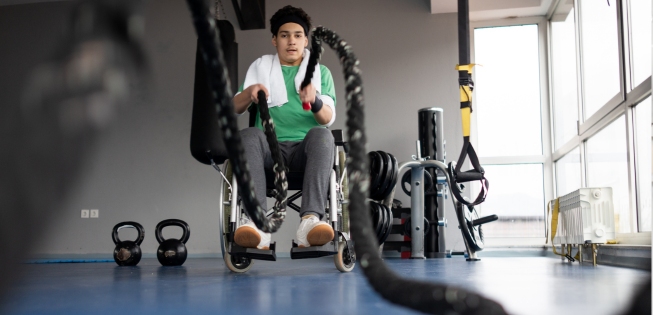
Helping kids of all ages to live a more active life through FUNctional movement.
Welcome to Play On Pediatric Therapy
Call

By: Michelle Warren, Physiotherapist (Pediatrics)
As a parent of a child with neuromuscular conditions such as Cerebral Palsy (CP), you understand the unique challenges and joys that come with nurturing their growth and development. Alongside medical care and therapy, integrating strength training into your child’s routine can be a powerful tool in promoting their overall well-being, confidence and independence. In this blog, we’ll delve into the significance of strength training for children with CP, explore some effective ways to get started, and discuss crucial safety precautions to ensure your child’s safety and progress.

Strength training plays a pivotal role in enhancing physical and cognitive health and functional abilities for children with CP. Here’s why it’s particularly beneficial:
Improved mobility and functionality: Regular strength training exercises can help enhance muscle strength and flexibility, enabling your child to perform daily activities with greater ease and independence, including walking.
Prevention of secondary health issues: Children with disabilities often face a higher risk of developing secondary health issues such as obesity, osteoporosis, and cardiovascular diseases. Strength training can help mitigate these risks by promoting weight management, bone health, and cardiovascular fitness.
Enhanced self-esteem and confidence: Achieving physical milestones through strength training can boost your child’s self-esteem and confidence. As they witness their own progress and capabilities, they are more likely to engage in social activities and interact with their peers positively.
Improved balance: Having more strength can help your child gain and maintain better balance, which in turn, improves function and mobility.
Better brain function: Resistance training causes your muscles to create brain-derived neurotrophic factor (BDNF), which is essential for learning and memory, and the reduction in depression and anxiety.

When embarking on a strength training program for your child, it’s essential to tailor the exercises to their individual needs and abilities. Here are some effective ways to get started:
Consult with healthcare professionals: Before initiating any strength training regimen, consult with your child’s healthcare team, including physiotherapists, kinesiologists, athletic therapists and occupational therapists. They can provide valuable insights and recommendations based on your child’s specific condition and abilities. The team here at Play On Pediatric Therapy here in Ottawa can offer specialized guidance tailored to your child’s needs.
Start slowly and progress gradually: Begin with simple, low-impact exercises and gradually increase the intensity and complexity as your child’s strength and endurance improve. Focus on proper form and technique to prevent injuries and maximize benefits. Starting slowly also decreases the chances of having soreness induced from the physical activity, which may deter your child from participating again.
Incorporate variety: Keep your child engaged and motivated by incorporating a variety of strength training exercises into their routine. These may include resistance band exercises, bodyweight exercises, modified yoga poses, and using adaptive equipment such as stability balls, sleds, balance bars, or balance boards.

While strength training can offer numerous benefits, it’s crucial to prioritize safety to prevent injuries and ensure a positive experience for your child. Here are some safety precautions to keep in mind:
Supervision: Always supervise your child during strength training sessions to ensure they are performing exercises correctly and safely. Provide hands-on assistance and support as needed, especially when using equipment or performing challenging movements.
Proper warm-up and cool-down: Begin each session with a gentle warm-up to prepare your child’s muscles and joints for exercise, followed by a cool-down to help prevent muscle soreness and promote relaxation.
Listen to your child’s body: Encourage your child to listen to their body and communicate any discomfort or pain during exercise. If they experience any pain or discomfort, modify the exercise or discontinue it altogether.
Adapt exercises as needed: Modify exercises to accommodate your child’s abilities and limitations. Focus on quality over quantity and avoid pushing your child beyond their capabilities. That being said, sometimes we need to work through some discomfort to get strength gains. Also, remember that children with CP may have to repeat exercises many more times to ‘get’ them. Don’t give up – keep on going! It may look different between kids, but that’s okay!

Due to skeletal immaturity, it is not recommended that children and youth lift heavy weights until they are in their later teen years. Stick to resistance bands, stability exercises and bodyweight exercises with lower loads, but you can still challenge the load and increase endurance, strength & power in kids with CP.
Most of us have heard that strength training in adults is an excellent choice for health, function and mobility benefits. However there are more misconceptions about children and youth strength training.
Strength training is not “bad”!: As mentioned previously, “strength training” is not synonymous with “weight training”. We can use a variety of equipment for strength training, while we usually lift moderate to heavy weights when weight training. The first is better for children – get creative and have fun!
Working muscles in children with CP does NOT increase tone: Newer studies are showing that strength training can actually help to mobilize the body and does not cause increased pain.

Strength training holds immense potential for improving the physical and cognitive health, functionality, and overall well-being of children with disabilities. By incorporating tailored strength training exercises into your child’s routine and prioritizing safety precautions, you can empower them to reach their full potential and thrive. Remember to consult with healthcare professionals, start slowly, and provide ongoing support and encouragement to make the journey of strength training a rewarding and beneficial experience for your child. You may also want to consult with a Dietician or Nutritionist to make sure you are providing optimal nutrition and hydration to support your child’s goals.
As you embark on this journey, celebrate every milestone and achievement, no matter how small, and remember that with patience, dedication, and love, your child can conquer any challenge that comes their way. If you need more help or guidance, the team here at Play On Pediatric Therapy can support your child with CP in their strength training and fitness goals. Together, let’s empower our children to soar beyond limitations and embrace their infinite potential.


Helping kids of all ages to live a more active life through FUNctional movement.
Call us anytime

Recent Comments